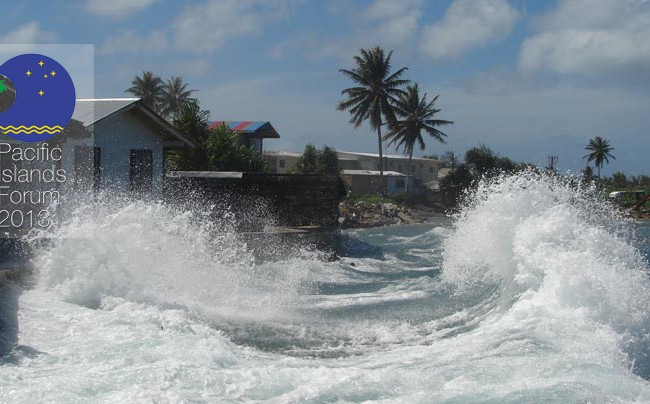
Marshalling a response to climate change
The aggressive campaign of the Marshall Islands to gain global action on climate change comes against a backdrop of increasingly worrying scientific reports about the evolving threat of rising sea levels.
The hosting next month of the Pacific Islands Forum by the Marshall Islands has activated government leadership as never before on the climate issue. They have ramped up rhetoric and the country’s media profile to full wattage, with campaigns focusing on the United States and Australia, calling on their leaders to take the lead by joining Pacific countries to avert a climate catastrophe.
Clearly, if the Forum wants the world to take a climate leadership pitch seriously, it needs the US, Australia and Japan — all of which have to some degree acknowledged the developing climate crisis. So the real question is how to bring the leaders of these nations along. That question in so far as Australia goes won’t be answerable until after the September 7 election, which falls the day after the end of the Forum in Majuro, ensuring that Foreign Minister Bob Carr will attend the Majuro meetings instead of PM Kevin Rudd.
As to the United States, when the Marshall Islands government did not receive confirmation of its invitation earlier in the year for US Secretary of State John Kerry to attend the Forum next month, it went on a media blitz in July. In the widely read US-based Huffington Post Internet news site, President Christopher Loeak, in a blog, issued an open letter to Kerry in late July, publicly inviting the Secretary to come to Majuro to launch a ‘new wave of political momentum to tackle the challenge of our generation’. The President said the Marshall Islands wanted Kerry in Majuro so he could show the U.S. government’s support for a ‘Majuro Declaration for Climate Leadership.’
Minister in Assistance to the President Tony deBrum followed this up with a high-profile week in Australia, speaking on climate change to government officials, university and donor groups, and the media. The Australian newspaper The Age headlined, ‘Marshall Islands urges its “big brother” to stand up for it on climate change,’ a story about deBrum calling for the Australian government to step up its climate engagement. He also said Secretary Kerry needed to be at the Forum in Majuro. ‘We feel very strongly that if (Kerry) does not attend it would be a slap in the face and like the United States would be reversing its so-called pivot to the Pacific,’ deBrum said.
Although Pacific islands will be among the first to suffer the effects of climate change, with the possible exception of Papua New Guinea, island countries and territories are so miniscule in the global context as to be off the map. The Forum as a unified group can gain greater traction in international meetings on climate change, but it clearly needs at least a couple of the developed Pacific rim nations to lend weight to whatever declaration is issued in Majuro.
For governments that need the US, Australia and Japan on board on this issue and have the diplomatic connections to gain face-to-face, closed door meetings with the highest levels in these three governments, it would seem that the Marshall Islands, if not the Forum, is wasting capital with its recent publicity barrage. The rhetoric resonates well with other Forum island countries that are in the same boat, but that is preaching to the converted. In light of business, public and government sentiment in developed countries that are hurdles to climate action, getting some of the Pacific’s key donor partners to demonstrate leadership on climate change is a huge undertaking that will take quiet but persistent diplomatic engagement combined with, at strategic points, publicity campaigns.
Next month’s Forum theme, ‘Marshalling a Pacific Response to the Climate Challenge,’ will keep the issue front and center in Majuro, and is expected to result in a stand alone declaration calling for global leadership to avoid a climate catastrophe.
Besides promoting a draft of the proposed climate change declaration among Forum members in the lead up to the September 3-6 leaders meeting, the Marshall Islands is sponsoring a special panel of experts’ roundtable on climate leadership on the Forum theme the day before the official opening. Officials representing a variety of institutions working on climate change issues are flying into Majuro to offer presentations at this half-day event, which is timed to gain media exposure the day prior to the official opening of the Forum.
The aim is to use a Majuro climate change declaration to jump start expanding regional leadership efforts for next year’s Third International Conference on Small Island Developing States to be held in Samoa in September 2014, and a possible world leaders meeting on climate change that UN Secretary General Ban-Ki Moon is reportedly planning to sponsor next year.
Pacific nations have little clout in global climate change negotiations, but it would appear that a clear statement will come out of Majuro calling on developed nations for action far beyond what we’ve seen to date to reduce greenhouse gas emissions to avert a worst-case climate scenario. A key issue at this point is getting Pacific Rim nations that are already engaged in the Pacific to endorse a Majuro declaration of action to help propel it onto the global agenda.

